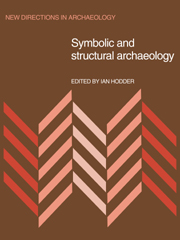Preface
Published online by Cambridge University Press: 27 February 2010
Summary
The idea for this volume grew out of a series of graduate seminars in Cambridge in the academic year 1979–80. Preliminary drafts of a majority of the papers were presented at a conference entitled Symbolism and Structuralism in Archaeology in Cambridge in April 1980, organised by members of the seminar group. There has been considerable discussion within the group concerning the papers in this volume, which should be regarded as a joint editorial venture although, as will be noted in chapter 1, a wide range of often contrasting views is represented.
During the early period of exploration and development of ideas, premature conference presentations and individual seminars were given by various members of the Cambridge group in other archaeology departments in England and abroad. Individual scholars who were invited to talk to us in Cambridge in that period often felt, understandably, obliged to maintain a distinct opposition. While it is certainly the case that these presentations had occurred before our views had even begun to settle down, and that they were excessively aggressive, they played an important role in the process of enquiry and reformulation. In particular, the contrasts which were set up by us and by outside scholars allowed the views of the seminar group, and the differences of viewpoint within the group, to be clarified. The opposition highlighted our own opinions but also threw the spotlight on the blind alleys down which there was a danger of straying. Our aggression resulted from the conviction that we were doing something new. This, too, was important.
- Type
- Chapter
- Information
- Symbolic and Structural Archaeology , pp. vii - viiiPublisher: Cambridge University PressPrint publication year: 1982

